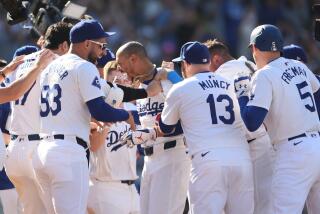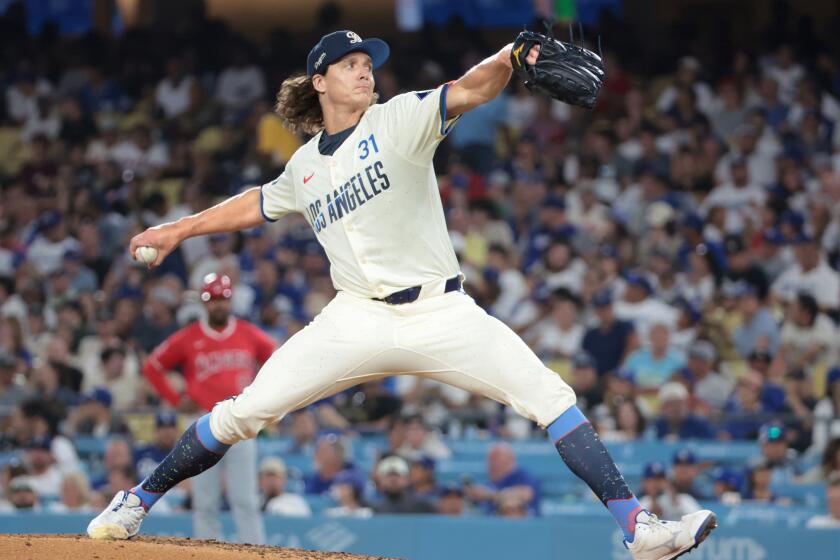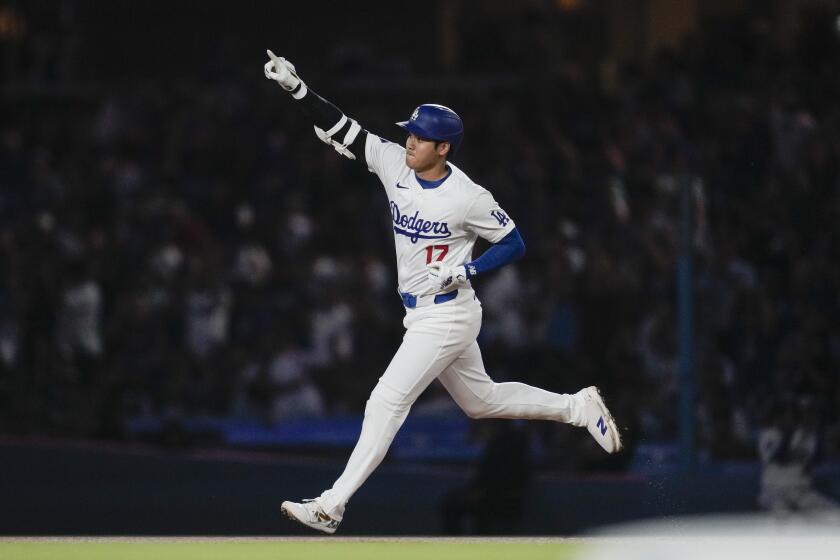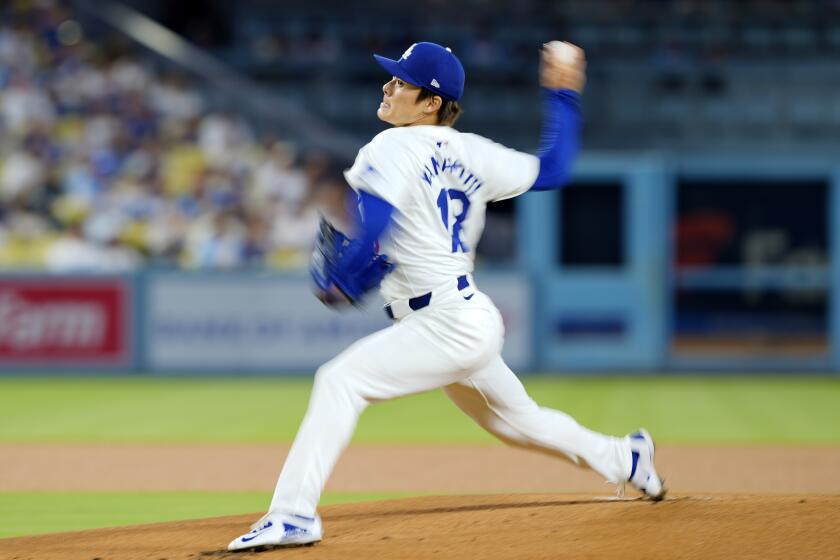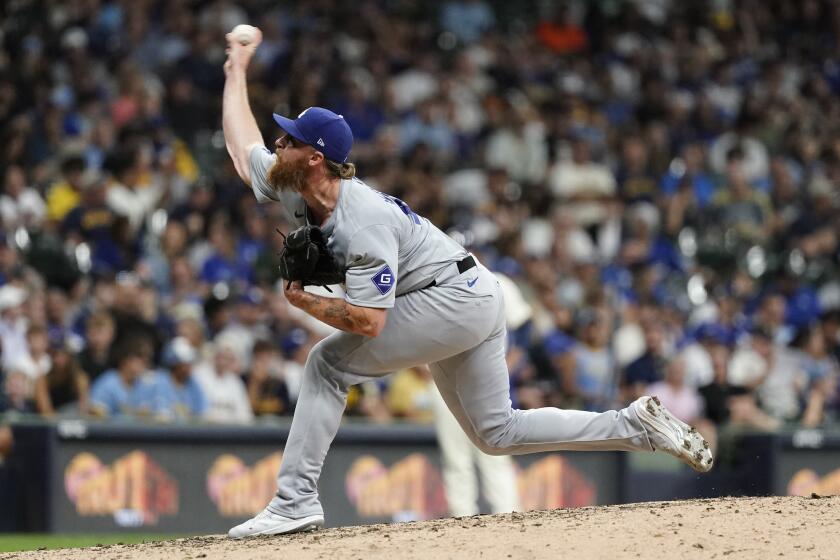Anderson glad to be home, even in new kind of home
He sat in front of his locker dressed from cap to shoes in blue for the first time, as difficult to accept for some as he did wearing anything other than black spikes for the last 17 years.
“Really, really bright, aren’t they?” says Garret Anderson, as if the team is giving him no choice but think blue as he laces up his shoes.
At 37, his hair now is a little gray across the top, but just what you might expect from someone who played 2,013 games for the Angels, more than anyone else in franchise history.
He’s a career .295 hitter -- most everyone else in the Dodgers’ clubhouse only dreaming of such long-term success, and yet Anderson is wearing double zeroes across his back, a minor league contract in hand and for the first time since ‘94, he says, placed in the position of having to prove he belongs in the big leagues.
“A few years ago when Tim Salmon was a guest at Angels camp he says to me, ‘It’s funny when you come up, you got to show them you can play, and when you get older you got to show them again you can play.’
“But it’s like I told my kids when I left L.A., either way it goes, I’m coming home. I’m coming home for good, or I’m coming home to play for the Dodgers.”
He has the choice of jersey 00 or 84 when he arrives, but 84 is something one might find on the back of a tight end, and isn’t 00 all about a fresh start?
Andre Ethier wears No. 16, Anderson’s number, which is tied to so many Angels records, but when someone tells Anderson he can have No. 16, he protests.
“Ethier is going to be here a lot longer than I am,” Anderson says. “Besides, the number doesn’t define anybody.”
It’ll be another week before he joins the lineup, but he has been working since early November for this chance, the Dodgers in need of a left-handed pinch hitter.
So if he’s to make it, he will have to beat out Brian Giles, who has a bad knee, and Doug Mientkiewicz, who is coming off a serious shoulder injury.
“No sour notes if this doesn’t go well,” Anderson says. “I’m not going to let anything ruin the big picture.”
He begins the day running drills beside Manny Ramirez in left, and knows he also will have to reacquaint himself with right field for the first time since ’98 if he wants to make himself more valuable.
He finishes with grass stains on his pants, but is quick to point out with a laugh -- no, hasn’t started diving for balls now that’s he joined the boys in blue.
“Just stretching,” he says. “When I call home, you know my wife’s going to want to know, how’s my swing? The last few years she’s suddenly become a hitting coach. The first few years when I was hitting everything, she didn’t say a word. Now she wants to know, why isn’t it working?
“Well, it doesn’t work forever. That’s the terrible thing about it, it really is. It’s a difficult transition from having no worries for 20 years, and then there’s this slow decline. Even if it ends on a great note, you’re still going to ask yourself, ‘Why can’t I keep playing? Why is my body doing this to me?’ But that’s the aging process -- that’s life.”
When he left the Angels, he thought about retiring. “When all 30 teams don’t call, that’s just reality,” he says.
He got a chance, though, with the Braves, but then as it happens, his body betrayed him, a calf injury setting him back. But in July he came on to hit .326 with five homers, something still left in the tank.
The phone went dead again at the end of the season. The last few weeks it was unavoidable. He was thinking retirement, although he never came close to making a public announcement.
“I never will,” he says. “I’ll just disappear.”
The Dodgers’ clubhouse is already better off with Anderson, Matt Kemp immediately gravitating his way.
“I want to hear everything he has to say,” Kemp says.
The best advice, Anderson says, is the advice he has given himself in still trying to make a contribution.
“You just keep going until you can’t keep going,” he says, but then what?
“I don’t know, I haven’t really lived yet. I know I want to go back to school. I signed out of high school, it was the first year they were giving scholarship money and I’ve got $30,000 in a scholarship fund. It sits there as long as you’re in pro baseball, and if I remember correctly, it goes away starting two years after your last game.”
You think it’s tough cracking the Dodgers’ roster, how about taking the SAT so many years later in life?
Anderson laughs. He was going to begin this summer, but then told his wife maybe he’d wait for the winter.
“I don’t have any one thing to study in school,” he says, “but one reason to go back -- I’d like to be an example for my kids and get an education.”
He’s a Dodger now, but probably always an Angel, although he says, “I don’t recognize them. I saw it coming, but they’ve really turned that team over.
“I have no hard feelings when it comes to the Angels. Sure, you fabricate ways about how it might end in your mind when you’ve been somewhere so long, but it’s a business.
“You have to take the emotion aside because it will kill you. I went down that road a little bit, got emotional, and was saying, ‘How can they?’
“But how lucky was I? I got a World Series and a chance to play most of my career in front of my family.”
That’s the way it began, the (happy) ending -- yet to be written. “I’ve already been blessed, no matter how it ends,” he says.
--
More to Read
Are you a true-blue fan?
Get our Dodgers Dugout newsletter for insights, news and much more.
You may occasionally receive promotional content from the Los Angeles Times.
